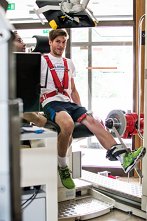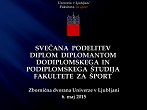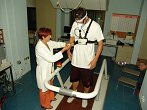Heat and hypoxia are among the most commonly encountered and investigated environmental stressors known to affect human performance and induce physiological adaptations. However, most of the up-to-date environmental physiological research is still conducted using male-only participants even though we nowadays know that most of the physiological responses (e.g. thermoregulatory, cardiovascular and hematological – all addressed in the present proposal) are importantly modulated by sex. It is therefore unsurprising that our current understanding of female-specific environmental adaptation and tolerance is notably limited. Accordingly, the aim of the present project is to provide a novel & comprehensive insight into the modulation of physiological, metabolic and thermoregulatory systems as well as performance adaptation to independent and combined prolonged exposure to hypoxia and heat in combination with exercise training in female individuals. Based on our previous work in male participants we are particularly interested in the cross-tolerance aspect of heat and hypoxic adaptations in females. This phenomenon, whereby adaptation to one environmental stressor may affect the responses when exposed to another environmental stressor, has been termed cross-adaptation. Given the fact that the general as well as the »cross-tolerance« potential of heat and hypoxia on performance and thermoregulatory responses remains scarcely investigated (even in males) the aim of the proposed project is to, for the first time, comprehensively assess the cross-over effects between prolonged acclimatization to heat, hypoxia and exercise training in female cohort that has up-to-now not been investigated. By using an interdisciplinary (basic science, medicine, kinesiology) approach and in combination with the proposed monitoring of numerous biochemical markers we aim to elucidate the main underlying cellular mechanisms of the cross-adaptation phenomenon in females. The key objectives of the proposed project are therefore, to investigate the potential of the following 14-day (two week) acclimatization protocols: 1) Heat acclimatization, 2) Continuous hypoxic acclimatization and 3) Combined heat and hypoxic acclimatization; on hematological, thermoregulatory, biochemical and performance indices in females during rest and exercise in temperate normoxic (23°C, normoxia), hot (35°C, normoxia) and hypoxic (23°C, hypoxia) environments. Importantly, the aim of the present proposal is not to directly compare the responses between sexes but, rather, to extend our understanding of female physiological responses and acclimatization to independent or combined heat and hypoxia and particularly to investigate the potential cross-adaptation potential in females. The project will be performed as a series of sequential studies with healthy, trained females performed in a randomized, controlled and counterbalanced manner. The main value of the current project proposal is to expand or current understanding of the manner and mechanism that underlie female-specific adaptation to heat and hypoxia and elucidate potential cross-tolerance effects of these two environmental factors in females. Additionally, the present project incorporates an important applied aspect; namely to investigate a potential of protocols in ether hypoxia or heat for: 1) Alleviating the physiological (over)load upon exposure to the other stressor in females; 2) Improving exercise performance in females and 3) Identifying potential for beneficial health-related impact of the cross-adaptation methods.
More informations can be found at the link.



































.png)